Deck 1: Thinking Like an Astronomer
Question
Question
Question
Question
Question
Question
Question
Question
Question
Question
Question
Question
Question
Question
Question
Question
Question
Question
Question
Question
Question
Question
Question
Question
Question
Question
Question
Question
Question
Question
Question
Question
Question
Question
Question
Question
Question
Question
Question
Question
Question
Question
Question
Question
Question
Question
Question
Question
Question
Question
Question
Question
Question
Question
Question
Question
Question
Question
Question
Question
Question
Question
Question
Question
Question
Question
Question
Question
Question
Question
Question
Question
Question
Question
Question
Question
Question
Question
Question
Question

Unlock Deck
Sign up to unlock the cards in this deck!
Unlock Deck
Unlock Deck
1/97
Play
Full screen (f)
Deck 1: Thinking Like an Astronomer
1
When a change occurs on the surface of the Sun, how long does it take before astronomers on Earth can see the change?
A) 8 minutes
B) 11 hours
C) 1 second
D) 1 day
E) It reaches us instantaneously.
A) 8 minutes
B) 11 hours
C) 1 second
D) 1 day
E) It reaches us instantaneously.
8 minutes
2
A light-year is a unit commonly used in astronomy as a measure of
A) time.
B) speed.
C) mass.
D) distance.
E) acceleration.
A) time.
B) speed.
C) mass.
D) distance.
E) acceleration.
distance.
3
A light-hour is a measure of
A) time.
B) distance.
C) energy.
D) speed.
E) acceleration.
A) time.
B) distance.
C) energy.
D) speed.
E) acceleration.
distance.
4
If one thinks about the distance between Earth and the Moon, 384,400 km, approximately how much of that distance would Saturn and its rings take up?
A) much more than this distance
B) less than half this distance
C) more than half this distance
D) exactly this distance
E) None of these choices is correct.
A) much more than this distance
B) less than half this distance
C) more than half this distance
D) exactly this distance
E) None of these choices is correct.

Unlock Deck
Unlock for access to all 97 flashcards in this deck.
Unlock Deck
k this deck
5
The time it takes light to cross Neptune's orbit is closest to which of the following?
A) instantaneous
B) a second
C) a quick meal
D) a night's sleep
E) the time between presidential elections
A) instantaneous
B) a second
C) a quick meal
D) a night's sleep
E) the time between presidential elections

Unlock Deck
Unlock for access to all 97 flashcards in this deck.
Unlock Deck
k this deck
6
Our galaxy and the few dozen nearest galaxies are known as the
A) Solar System.
B) Milky Way.
C) Local Group.
D) Virgo Supercluster.
E) Laniakea Supercluster.
A) Solar System.
B) Milky Way.
C) Local Group.
D) Virgo Supercluster.
E) Laniakea Supercluster.

Unlock Deck
Unlock for access to all 97 flashcards in this deck.
Unlock Deck
k this deck
7
The distance to the nearest large spiral galaxy, the Andromeda Galaxy, is 2.4 * 1022 m.How long does it take light to travel from Andromeda to us?
A) 4.4 years
B) 360 years
C) 1.2 thousand years
D) 2.5 million years
E) 4.5 billion years
A) 4.4 years
B) 360 years
C) 1.2 thousand years
D) 2.5 million years
E) 4.5 billion years

Unlock Deck
Unlock for access to all 97 flashcards in this deck.
Unlock Deck
k this deck
8
One of the nearest stars, Alpha Centauri, is 4.4 light-years from Earth.The time it takes light to travel from Alpha Centauri to us is
A) 1.25 seconds.
B) 8.3 minutes.
C) 4.4 years.
D) 600 years.
E) 2.2 million years.
A) 1.25 seconds.
B) 8.3 minutes.
C) 4.4 years.
D) 600 years.
E) 2.2 million years.

Unlock Deck
Unlock for access to all 97 flashcards in this deck.
Unlock Deck
k this deck
9
After the Sun, the next nearest star to us is approximately ________ away.
A) 8 light-seconds
B) 80 light-minutes
C) 40 light-hours
D) 4 light-years
E) 200 light-years
A) 8 light-seconds
B) 80 light-minutes
C) 40 light-hours
D) 4 light-years
E) 200 light-years

Unlock Deck
Unlock for access to all 97 flashcards in this deck.
Unlock Deck
k this deck
10
What is the approximate number of stars in the Milky Way?
A) 10 million
B) 300 million
C) 10 billion
D) 300 billion
E) 1 trillion
A) 10 million
B) 300 million
C) 10 billion
D) 300 billion
E) 1 trillion

Unlock Deck
Unlock for access to all 97 flashcards in this deck.
Unlock Deck
k this deck
11
The diameter of the Moon is
A) larger than the distance across the continental United States.
B) roughly equal to the longest distance across Texas.
C) more than half the distance across the continental United States.
D) less than half the distance across the continental United States.
E) None of these choices is correct.
A) larger than the distance across the continental United States.
B) roughly equal to the longest distance across Texas.
C) more than half the distance across the continental United States.
D) less than half the distance across the continental United States.
E) None of these choices is correct.

Unlock Deck
Unlock for access to all 97 flashcards in this deck.
Unlock Deck
k this deck
12
The Sun is a
A) supercluster.
B) moon.
C) galaxy.
D) star.
E) planet.
A) supercluster.
B) moon.
C) galaxy.
D) star.
E) planet.

Unlock Deck
Unlock for access to all 97 flashcards in this deck.
Unlock Deck
k this deck
13
The Andromeda Galaxy is also part of the Local Group, so it is also part of
A) the Solar System.
B) the Milky Way.
C) the Moon.
D) the Virgo Supercluster.
E) dark energy.
A) the Solar System.
B) the Milky Way.
C) the Moon.
D) the Virgo Supercluster.
E) dark energy.

Unlock Deck
Unlock for access to all 97 flashcards in this deck.
Unlock Deck
k this deck
14
How many times larger is our galaxy (100,000 light-years across) than our Solar System (11 light-hours across)?
A) 100
B) 1,000
C) 10,000
D) 106
E) 108
A) 100
B) 1,000
C) 10,000
D) 106
E) 108

Unlock Deck
Unlock for access to all 97 flashcards in this deck.
Unlock Deck
k this deck
15
The number of planets in our Solar System is
A) six.
B) eight.
C) nine.
D) twelve.
E) twenty.
A) six.
B) eight.
C) nine.
D) twelve.
E) twenty.

Unlock Deck
Unlock for access to all 97 flashcards in this deck.
Unlock Deck
k this deck
16
According to the figure below, if you were to specify your address in the universe, listing your membership from the smallest to largest physical structures, it would be 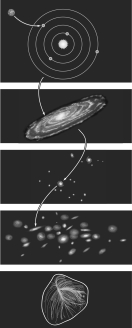
A) Earth, Local Group, Solar System, Andromeda, the universe.
B) Earth, Solar System, Local Group, Milky Way, the universe.
C) Earth, Solar System, Milky Way, Local Group, Laniakea Supercluster, the universe.
D) Earth, Solar System, Milky Way, Laniakea Supercluster, the universe.
E) Earth, Laniakea Supercluster, Milky Way, Solar System, the universe.

A) Earth, Local Group, Solar System, Andromeda, the universe.
B) Earth, Solar System, Local Group, Milky Way, the universe.
C) Earth, Solar System, Milky Way, Local Group, Laniakea Supercluster, the universe.
D) Earth, Solar System, Milky Way, Laniakea Supercluster, the universe.
E) Earth, Laniakea Supercluster, Milky Way, Solar System, the universe.

Unlock Deck
Unlock for access to all 97 flashcards in this deck.
Unlock Deck
k this deck
17
Milky Way is the name of
A) our Solar System.
B) the galaxy in which we live.
C) the local group of galaxies we are in.
D) the supercluster of galaxies we are in.
E) the entire universe.
A) our Solar System.
B) the galaxy in which we live.
C) the local group of galaxies we are in.
D) the supercluster of galaxies we are in.
E) the entire universe.

Unlock Deck
Unlock for access to all 97 flashcards in this deck.
Unlock Deck
k this deck
18
One of the nearest stars is Alpha Centauri, whose distance from Earth is 4.2 * 1016 m.How long does it take light to travel from Alpha Centauri to us?
A) 1.25 seconds
B) 8.3 minutes
C) 4.4 years
D) 560 years
E) 6,200 years
A) 1.25 seconds
B) 8.3 minutes
C) 4.4 years
D) 560 years
E) 6,200 years

Unlock Deck
Unlock for access to all 97 flashcards in this deck.
Unlock Deck
k this deck
19
According to the figure below, Earth is located approximately 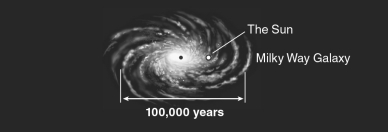
A) at the center of the Milky Way.
B) near the center of the Milky Way.
C) about halfway out from the center of the Milky Way.
D) at the farthest outskirts of the Milky Way.
E) outside the Milky Way, which is why we can see it as a band across the night sky.

A) at the center of the Milky Way.
B) near the center of the Milky Way.
C) about halfway out from the center of the Milky Way.
D) at the farthest outskirts of the Milky Way.
E) outside the Milky Way, which is why we can see it as a band across the night sky.

Unlock Deck
Unlock for access to all 97 flashcards in this deck.
Unlock Deck
k this deck
20
The average distance between Earth and the Sun is 1.5 *1011 m, and light from the Sun takes approximately ________ to reach Earth.
A) 8 seconds
B) 8 minutes
C) 8 hours
D) 8 days
E) 8 years
A) 8 seconds
B) 8 minutes
C) 8 hours
D) 8 days
E) 8 years

Unlock Deck
Unlock for access to all 97 flashcards in this deck.
Unlock Deck
k this deck
21
Before you can scientifically test a hypothesis, you must use the hypothesis to develop a
A) scientific theory.
B) claim that cannot be falsified.
C) prediction to test.
D) computer model.
E) new fact.
A) scientific theory.
B) claim that cannot be falsified.
C) prediction to test.
D) computer model.
E) new fact.

Unlock Deck
Unlock for access to all 97 flashcards in this deck.
Unlock Deck
k this deck
22
A hypothesis is an idea that is
A) Falsifiable.
B) undeniably true.
C) not falsifiable.
D) always part of a larger theory.
E) absolutely untrue.
A) Falsifiable.
B) undeniably true.
C) not falsifiable.
D) always part of a larger theory.
E) absolutely untrue.

Unlock Deck
Unlock for access to all 97 flashcards in this deck.
Unlock Deck
k this deck
23
Our universe is approximately 13.7 ________ years old.
A) hundred
B) thousand
C) million
D) billion
E) trillion
A) hundred
B) thousand
C) million
D) billion
E) trillion

Unlock Deck
Unlock for access to all 97 flashcards in this deck.
Unlock Deck
k this deck
24
The figure below measures distances in the amount of time it takes light to travel.If the circumference of Earth is a snap of your fingers (1/7 second), the diameter of the Solar System is approximately equal to 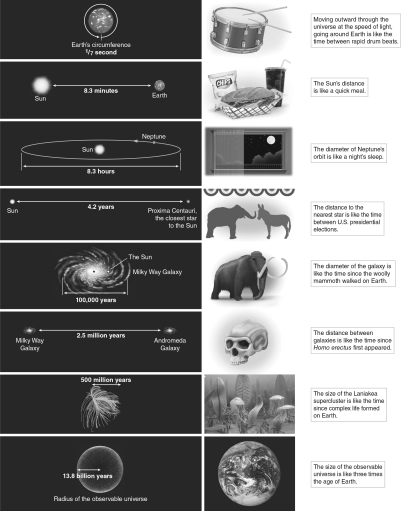
A) the length of a quick lunch.
B) the time to turn a page in a book.
C) the length of the workday.
D) the time you spent in high school.
E) a human lifetime.

A) the length of a quick lunch.
B) the time to turn a page in a book.
C) the length of the workday.
D) the time you spent in high school.
E) a human lifetime.

Unlock Deck
Unlock for access to all 97 flashcards in this deck.
Unlock Deck
k this deck
25
Which of the following is true?
A) A scientific theory is an undisputed fact.
B) If continual testing of a hypothesis shows it to be valid, it may become an accepted theory.
C) A hypothesis must never have one or more testable predictions.
D) A scientific theory must not be able to be proven wrong when scientists acquire new data.
E) A hypothesis can become a theory without it being tested.
A) A scientific theory is an undisputed fact.
B) If continual testing of a hypothesis shows it to be valid, it may become an accepted theory.
C) A hypothesis must never have one or more testable predictions.
D) A scientific theory must not be able to be proven wrong when scientists acquire new data.
E) A hypothesis can become a theory without it being tested.

Unlock Deck
Unlock for access to all 97 flashcards in this deck.
Unlock Deck
k this deck
26
In science an idea that cannot be tested is
A) a hypothesis.
B) not a scientific idea.
C) a theory.
D) a principle.
E) a law.
A) a hypothesis.
B) not a scientific idea.
C) a theory.
D) a principle.
E) a law.

Unlock Deck
Unlock for access to all 97 flashcards in this deck.
Unlock Deck
k this deck
27
The speed of light is approximately
A) 3,000 km/s.
B) 30,000 km/s.
C) 300,000 km/s.
D) 3 million km/s.
E) 3 billion km/s.
A) 3,000 km/s.
B) 30,000 km/s.
C) 300,000 km/s.
D) 3 million km/s.
E) 3 billion km/s.

Unlock Deck
Unlock for access to all 97 flashcards in this deck.
Unlock Deck
k this deck
28
A theoretical model is
A) a made-up explanation.
B) a detailed description in terms of known physical laws or theories.
C) a testable assumption.
D) a scientific law.
E) a detailed computer simulation.
A) a made-up explanation.
B) a detailed description in terms of known physical laws or theories.
C) a testable assumption.
D) a scientific law.
E) a detailed computer simulation.

Unlock Deck
Unlock for access to all 97 flashcards in this deck.
Unlock Deck
k this deck
29
A hypothesis may become a theory
A) automatically, as the terms mean the same thing.
B) if a majority of scientists agree on its propositions.
C) after it has been logically proved.
D) if it makes at least one verifiable prediction.
E) after many repeated attempts to falsify it fail.
A) automatically, as the terms mean the same thing.
B) if a majority of scientists agree on its propositions.
C) after it has been logically proved.
D) if it makes at least one verifiable prediction.
E) after many repeated attempts to falsify it fail.

Unlock Deck
Unlock for access to all 97 flashcards in this deck.
Unlock Deck
k this deck
30
In the scientific method, a fact is a(n)
A) opinion or an idea.
B) observation or a measurement.
C) type of test.
D) opinion backed by an expert.
E) rigorously tested theory.
A) opinion or an idea.
B) observation or a measurement.
C) type of test.
D) opinion backed by an expert.
E) rigorously tested theory.

Unlock Deck
Unlock for access to all 97 flashcards in this deck.
Unlock Deck
k this deck
31
A theory is
A) tied to known physical laws.
B) able to make testable predictions.
C) a hypothesis that has withstood many attempts to falsify it.
D) subject to being revised by new evidence.
E) all of these
A) tied to known physical laws.
B) able to make testable predictions.
C) a hypothesis that has withstood many attempts to falsify it.
D) subject to being revised by new evidence.
E) all of these

Unlock Deck
Unlock for access to all 97 flashcards in this deck.
Unlock Deck
k this deck
32
The scientific method is a process by which scientists
A) prove theories to be known facts.
B) gain confidence in theories by failing to prove them wrong.
C) show all theories to be wrong.
D) test the ideas of Aristotle.
E) survey what the majority of people think about a theory.
A) prove theories to be known facts.
B) gain confidence in theories by failing to prove them wrong.
C) show all theories to be wrong.
D) test the ideas of Aristotle.
E) survey what the majority of people think about a theory.

Unlock Deck
Unlock for access to all 97 flashcards in this deck.
Unlock Deck
k this deck
33
The statement "our universe is but one of a multitude of isolated universes" is best characterized as a(n)
A) speculative but unscientific idea.
B) scientific fact.
C) physical law.
D) hypothesis that is currently being tested.
E) impossible situation.
A) speculative but unscientific idea.
B) scientific fact.
C) physical law.
D) hypothesis that is currently being tested.
E) impossible situation.

Unlock Deck
Unlock for access to all 97 flashcards in this deck.
Unlock Deck
k this deck
34
The first event in the history of the universe is called the
A) Great Beginning.
B) Manhattan Project.
C) Universal Spring.
D) Big Bang.
E) None of these are correct, as the universe had no beginning.
A) Great Beginning.
B) Manhattan Project.
C) Universal Spring.
D) Big Bang.
E) None of these are correct, as the universe had no beginning.

Unlock Deck
Unlock for access to all 97 flashcards in this deck.
Unlock Deck
k this deck
35
Light from the Andromeda Galaxy that is just reaching us first left Andromeda when
A) the woolly mammoth last walked the Earth.
B) humans began exploring the skies with telescopes.
C) Homo erectus first walked the Earth.
D) the Solar System formed.
E) the universe began.
A) the woolly mammoth last walked the Earth.
B) humans began exploring the skies with telescopes.
C) Homo erectus first walked the Earth.
D) the Solar System formed.
E) the universe began.

Unlock Deck
Unlock for access to all 97 flashcards in this deck.
Unlock Deck
k this deck
36
A scientific theory can be shown to be wrong if
A) cultural beliefs evolve to contradict it.
B) scientists gather new data that contradict its predictions.
C) it cannot explain all phenomena in the universe.
D) it was first proposed as conjecture.
E) a majority of people do not accept it.
A) cultural beliefs evolve to contradict it.
B) scientists gather new data that contradict its predictions.
C) it cannot explain all phenomena in the universe.
D) it was first proposed as conjecture.
E) a majority of people do not accept it.

Unlock Deck
Unlock for access to all 97 flashcards in this deck.
Unlock Deck
k this deck
37
The majority of the mass in our universe is made up of
A) planets.
B) stars.
C) galaxies.
D) dust.
E) dark matter.
A) planets.
B) stars.
C) galaxies.
D) dust.
E) dark matter.

Unlock Deck
Unlock for access to all 97 flashcards in this deck.
Unlock Deck
k this deck
38
A ________ becomes a ________ when repeated testing of its predictions does not disprove it.
A) hypothesis; scientific method
B) theory; scientific revolution
C) phenomenon; theory
D) hypothesis; theory
E) law; theory
A) hypothesis; scientific method
B) theory; scientific revolution
C) phenomenon; theory
D) hypothesis; theory
E) law; theory

Unlock Deck
Unlock for access to all 97 flashcards in this deck.
Unlock Deck
k this deck
39
The majority of the energy in our universe is
A) radiated by stars from the nuclear fusion going on in their cores.
B) the kinetic energy found in the collisions of galaxies.
C) the gravitational potential energy of superclusters.
D) emitted in radioactive decays of unstable elements.
E) made up of dark energy that permeates space.
A) radiated by stars from the nuclear fusion going on in their cores.
B) the kinetic energy found in the collisions of galaxies.
C) the gravitational potential energy of superclusters.
D) emitted in radioactive decays of unstable elements.
E) made up of dark energy that permeates space.

Unlock Deck
Unlock for access to all 97 flashcards in this deck.
Unlock Deck
k this deck
40
How long does it take light to travel from the center of the Laniakea Supercluster (5 *1023 m away) to us?
A) 7,000 years
B) 54,000 years
C) 120,000 years
D) 12 million years
E) 54 million years
A) 7,000 years
B) 54,000 years
C) 120,000 years
D) 12 million years
E) 54 million years

Unlock Deck
Unlock for access to all 97 flashcards in this deck.
Unlock Deck
k this deck
41
The volume of a sphere is related to its radius by the formula  .Using algebra to solve for R, we get
.Using algebra to solve for R, we get
A)
B)
C)
D)
E)
 .Using algebra to solve for R, we get
.Using algebra to solve for R, we getA)

B)

C)

D)

E)


Unlock Deck
Unlock for access to all 97 flashcards in this deck.
Unlock Deck
k this deck
42
Scientific notation is used in astronomy primarily because it allows us to
A) write very large and very small numbers in a convenient way.
B) talk about science in an easy way.
C) change easy calculations into hard calculations.
D) change hard calculations into easy calculations.
E) explain science to engineers.
A) write very large and very small numbers in a convenient way.
B) talk about science in an easy way.
C) change easy calculations into hard calculations.
D) change hard calculations into easy calculations.
E) explain science to engineers.

Unlock Deck
Unlock for access to all 97 flashcards in this deck.
Unlock Deck
k this deck
43
If you have a stuffy nose, a fever, chills, and body aches and a doctor treats you for the flu rather than four separate diseases that account for each of your symptoms, this is an application of
A) Newton's hypothesis.
B) Occam's razor.
C) Aristotle's test.
D) Einstein's relativity.
E) the Copernican principle.
A) Newton's hypothesis.
B) Occam's razor.
C) Aristotle's test.
D) Einstein's relativity.
E) the Copernican principle.

Unlock Deck
Unlock for access to all 97 flashcards in this deck.
Unlock Deck
k this deck
44
The language of patterns, and therefore of science, is
A) Greek.
B) mathematics.
C) calculus.
D) Java.
E) Latin.
A) Greek.
B) mathematics.
C) calculus.
D) Java.
E) Latin.

Unlock Deck
Unlock for access to all 97 flashcards in this deck.
Unlock Deck
k this deck
45
When you see a pattern in nature, it is usually evidence of
A) a theory being displayed.
B) quantum mechanics in action.
C) a breakdown of random clustering.
D) an underlying physical law.
E) a decrease in entropy.
A) a theory being displayed.
B) quantum mechanics in action.
C) a breakdown of random clustering.
D) an underlying physical law.
E) a decrease in entropy.

Unlock Deck
Unlock for access to all 97 flashcards in this deck.
Unlock Deck
k this deck
46
If nature behaves according to a certain physical law, then that law should result in
A) random behavior.
B) repeating patterns.
C) Occam's razor.
D) quantum mechanics.
E) the Big Bang.
A) random behavior.
B) repeating patterns.
C) Occam's razor.
D) quantum mechanics.
E) the Big Bang.

Unlock Deck
Unlock for access to all 97 flashcards in this deck.
Unlock Deck
k this deck
47
One of the central assumptions in astronomy is that the physical laws of nature
A) change when objects move at high speed.
B) change throughout the age of the universe.
C) depend on the mass of the objects involved.
D) are the same everywhere in the universe.
E) change noticeably from place to place.
A) change when objects move at high speed.
B) change throughout the age of the universe.
C) depend on the mass of the objects involved.
D) are the same everywhere in the universe.
E) change noticeably from place to place.

Unlock Deck
Unlock for access to all 97 flashcards in this deck.
Unlock Deck
k this deck
48
(6 * 105) * (3 *10-2) =
A) 1.8 * 103
B) 1.8 * 104
C) 1.8 *106
D) 1.8 * 108
E) 1.8*10-3
A) 1.8 * 103
B) 1.8 * 104
C) 1.8 *106
D) 1.8 * 108
E) 1.8*10-3

Unlock Deck
Unlock for access to all 97 flashcards in this deck.
Unlock Deck
k this deck
49
The number 123,000 written in scientific notation is
A) 1.23* 106
B) 1.23 *105
C) 1.23 * 103
D) 1.23 * 10-6
E) 1.23 * 10-3
A) 1.23* 106
B) 1.23 *105
C) 1.23 * 103
D) 1.23 * 10-6
E) 1.23 * 10-3

Unlock Deck
Unlock for access to all 97 flashcards in this deck.
Unlock Deck
k this deck
50
The figure below shows the night sky as it appears to an observer in the United States at the same time of the night but at four different seasons of the year.A reasonable conclusion that can be drawn from these images is that 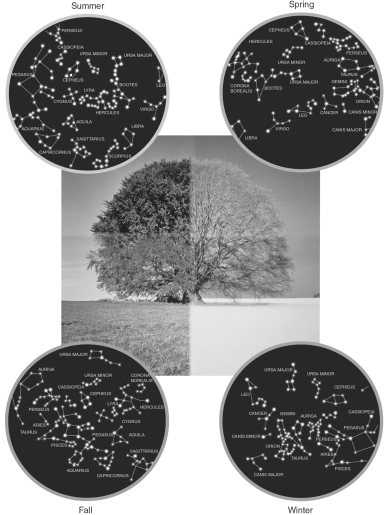
A) the stars move about the sky randomly.
B) the stars appear to rotate over the course of a year.
C) the night sky is always the same.
D) there are only four possible configurations of stars in the sky.
E) the position of the stars changes the temperature of the Earth.

A) the stars move about the sky randomly.
B) the stars appear to rotate over the course of a year.
C) the night sky is always the same.
D) there are only four possible configurations of stars in the sky.
E) the position of the stars changes the temperature of the Earth.

Unlock Deck
Unlock for access to all 97 flashcards in this deck.
Unlock Deck
k this deck
51
Albert Einstein's theory of relativity replacing Isaac Newton's theory of gravity is an example of
A) a failure of the scientific method.
B) Occam's razor.
C) the cosmological principle.
D) the provisional nature of scientific knowledge.
E) the need for creativity in scientists.
A) a failure of the scientific method.
B) Occam's razor.
C) the cosmological principle.
D) the provisional nature of scientific knowledge.
E) the need for creativity in scientists.

Unlock Deck
Unlock for access to all 97 flashcards in this deck.
Unlock Deck
k this deck
52
When two explanations describe something equally well, ________ says that we should assume the simpler one.
A) Newton's hypothesis
B) Occam's razor
C) Aristotle's test
D) Einstein's biggest blunder
E) the Copernican principle
A) Newton's hypothesis
B) Occam's razor
C) Aristotle's test
D) Einstein's biggest blunder
E) the Copernican principle

Unlock Deck
Unlock for access to all 97 flashcards in this deck.
Unlock Deck
k this deck
53
Because of ________, we can conclude that gravity works the same way on Earth as it does on Mars.
A) Newton's theory of relativity
B) Einstein's special theory of relativity
C) Sagan's planetary principle
D) the cosmological principle
E) the hypothetical statute
A) Newton's theory of relativity
B) Einstein's special theory of relativity
C) Sagan's planetary principle
D) the cosmological principle
E) the hypothetical statute

Unlock Deck
Unlock for access to all 97 flashcards in this deck.
Unlock Deck
k this deck
54
The number 1.5 * 104 can also be written as
A) 0.00015
B) 0.0015
C) 1,500
D) 15,000
E) 150,000
A) 0.00015
B) 0.0015
C) 1,500
D) 15,000
E) 150,000

Unlock Deck
Unlock for access to all 97 flashcards in this deck.
Unlock Deck
k this deck
55
If the speed of light is 3 * 105 km/s and 1 km = 0.62 mile, what is the speed of light in miles per hour (mph)?
A) 670 million mph
B) 670 thousand mph
C) 186 mph
D) 186 thousand mph
E) 3.2 billion mph
A) 670 million mph
B) 670 thousand mph
C) 186 mph
D) 186 thousand mph
E) 3.2 billion mph

Unlock Deck
Unlock for access to all 97 flashcards in this deck.
Unlock Deck
k this deck
56
When you let go of an apple, you expect it to fall to the ground.This is because
A) down is the only direction it can go in.
B) apples always move directly toward the largest object.
C) your science teacher has told you that is the only possibility.
D) red colors are attracted to green colors.
E) there has been a past pattern of objects always falling toward the Earth.
A) down is the only direction it can go in.
B) apples always move directly toward the largest object.
C) your science teacher has told you that is the only possibility.
D) red colors are attracted to green colors.
E) there has been a past pattern of objects always falling toward the Earth.

Unlock Deck
Unlock for access to all 97 flashcards in this deck.
Unlock Deck
k this deck
57
The area of a circle is related to its diameter by the  formula Using algebra to solve for D, we find that
formula Using algebra to solve for D, we find that
A)
B)
C)
D)
E)
 formula Using algebra to solve for D, we find that
formula Using algebra to solve for D, we find thatA)

B)

C)

D)

E)


Unlock Deck
Unlock for access to all 97 flashcards in this deck.
Unlock Deck
k this deck
58
The cosmological principle states that
A) the universe is expanding in all directions at the same rate.
B) a unique center of the universe exists.
C) the universe looks the same everywhere and in all directions as long as you look on large enough spatial scales.
D) physical laws change from place to place in the universe.
E) the universe is in a "steady state."
A) the universe is expanding in all directions at the same rate.
B) a unique center of the universe exists.
C) the universe looks the same everywhere and in all directions as long as you look on large enough spatial scales.
D) physical laws change from place to place in the universe.
E) the universe is in a "steady state."

Unlock Deck
Unlock for access to all 97 flashcards in this deck.
Unlock Deck
k this deck
59
(1.2* 109) * (4 *10-3) *
A) 3 * 106
B) 3 * 105
C) 3 * 1010
D) 3*1011
E) 3 *1012
A) 3 * 106
B) 3 * 105
C) 3 * 1010
D) 3*1011
E) 3 *1012

Unlock Deck
Unlock for access to all 97 flashcards in this deck.
Unlock Deck
k this deck
60
A scientific principle is
A) a scientific law.
B) a detailed description in terms of known physical laws or theories.
C) a general idea or sense about the universe.
D) an easily testable statement.
E) the next step beyond a scientific theory.
A) a scientific law.
B) a detailed description in terms of known physical laws or theories.
C) a general idea or sense about the universe.
D) an easily testable statement.
E) the next step beyond a scientific theory.

Unlock Deck
Unlock for access to all 97 flashcards in this deck.
Unlock Deck
k this deck
61
Using the method of comparing distances to time intervals to get a handle on the large distances in astronomy, compare the diameter of our Solar System, which is 6 *1012, to the diameter of the galaxy, which is 1.2 *1021, by calculating the time it would take for light to travel these diameters.For reference, the speed of light is 3 *108 m/s.

Unlock Deck
Unlock for access to all 97 flashcards in this deck.
Unlock Deck
k this deck
62
Approximately how many viruses are there at time step 10 in the figure below? 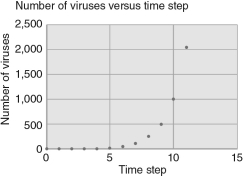
A) 500
B) 1,000
C) 1,500
D) 2,000
E) 2,500

A) 500
B) 1,000
C) 1,500
D) 2,000
E) 2,500

Unlock Deck
Unlock for access to all 97 flashcards in this deck.
Unlock Deck
k this deck
63
What is the slope of line in the figure below? 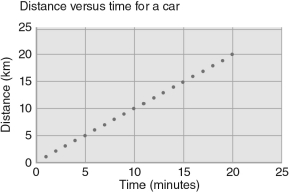
A) 0 km/h
B) 6 km/h
C) 6 h/km
D) 60 km/h
E) 60 h/km

A) 0 km/h
B) 6 km/h
C) 6 h/km
D) 60 km/h
E) 60 h/km

Unlock Deck
Unlock for access to all 97 flashcards in this deck.
Unlock Deck
k this deck
64
If you compare the diameter of Earth to 1 minute of time, then what interval of time would represent the diameter of the Solar System? Assume the diameter of the Solar System is approximately 80 AU.

Unlock Deck
Unlock for access to all 97 flashcards in this deck.
Unlock Deck
k this deck
65
How would you respond to someone who stated that "Evolution is not proven; it is just a theory"?

Unlock Deck
Unlock for access to all 97 flashcards in this deck.
Unlock Deck
k this deck
66
What would you say to someone who said, "It would take light-years to get to the Andromeda Galaxy"?

Unlock Deck
Unlock for access to all 97 flashcards in this deck.
Unlock Deck
k this deck
67
The orbital period of Mercury is 88 days.What is its orbital period in units of seconds?
A) 76,000 seconds
B) 7.6 million seconds
C) 7.6 billion seconds
D) 760 billion seconds
E) 76 million seconds
A) 76,000 seconds
B) 7.6 million seconds
C) 7.6 billion seconds
D) 760 billion seconds
E) 76 million seconds

Unlock Deck
Unlock for access to all 97 flashcards in this deck.
Unlock Deck
k this deck
68
Describe how we can use travel times as a measure for distances.

Unlock Deck
Unlock for access to all 97 flashcards in this deck.
Unlock Deck
k this deck
69
What is the only thing that makes the Sun an exceptional star?

Unlock Deck
Unlock for access to all 97 flashcards in this deck.
Unlock Deck
k this deck
70
The study of whether or not life exists elsewhere in the Solar System and beyond is called
A) origins.
B) biochemistry.
C) cosmology.
D) astrobiology.
E) exoplanetology.
A) origins.
B) biochemistry.
C) cosmology.
D) astrobiology.
E) exoplanetology.

Unlock Deck
Unlock for access to all 97 flashcards in this deck.
Unlock Deck
k this deck
71
When we look at distant objects, we see them as they were in the past.Why is this?

Unlock Deck
Unlock for access to all 97 flashcards in this deck.
Unlock Deck
k this deck
72
What implication does the finite speed of light have on what we observe in the universe?

Unlock Deck
Unlock for access to all 97 flashcards in this deck.
Unlock Deck
k this deck
73
What does the word dark mean in the terms dark matter and dark energy?

Unlock Deck
Unlock for access to all 97 flashcards in this deck.
Unlock Deck
k this deck
74
Suppose you were writing to a pen pal in another universe.What address would you put on the envelope that included all the major structures in which we reside? (Hint: Your cosmic address should begin with "Earth" and end with "the universe.")

Unlock Deck
Unlock for access to all 97 flashcards in this deck.
Unlock Deck
k this deck
75
Which graph in the figures below is a plot of a linear behavior? 
A) figure (a)
B) figure (b)
C) figure (c)
D) none of these
E) all three graphs

A) figure (a)
B) figure (b)
C) figure (c)
D) none of these
E) all three graphs

Unlock Deck
Unlock for access to all 97 flashcards in this deck.
Unlock Deck
k this deck
76
What are the units of the vertical axis in the figure below? 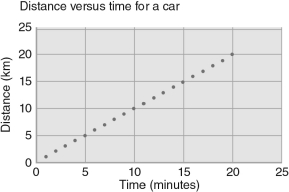
A) km
B) hours
C) km/h
D) h/km
E) There are no units on this axis.

A) km
B) hours
C) km/h
D) h/km
E) There are no units on this axis.

Unlock Deck
Unlock for access to all 97 flashcards in this deck.
Unlock Deck
k this deck
77
What is the Local Group?

Unlock Deck
Unlock for access to all 97 flashcards in this deck.
Unlock Deck
k this deck
78
Using the method of comparing times to get a handle on the large distances in astronomy, compare the size of Earth to the size of the visible universe.Start by making the size of Earth comparable to a snap of your fingers, which lasts about 1/7 second.Show your computation.

Unlock Deck
Unlock for access to all 97 flashcards in this deck.
Unlock Deck
k this deck
79
Explain the scientific definitions for the terms idea, hypothesis, and theory, and how they are distinct concepts from one another.

Unlock Deck
Unlock for access to all 97 flashcards in this deck.
Unlock Deck
k this deck
80
Approximately how many viruses are there at time step 5 in the figure below? 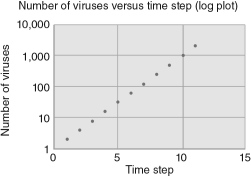
A) 2
B) 10
C) 30
D) 90
E) 100

A) 2
B) 10
C) 30
D) 90
E) 100

Unlock Deck
Unlock for access to all 97 flashcards in this deck.
Unlock Deck
k this deck


